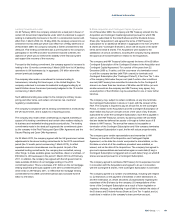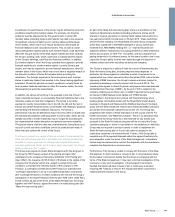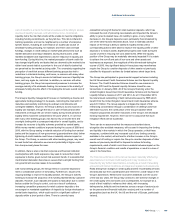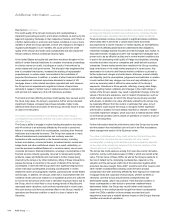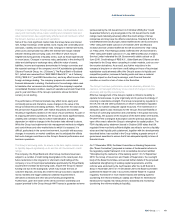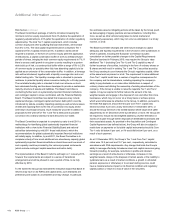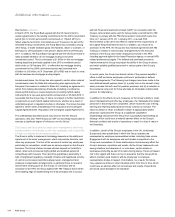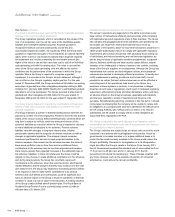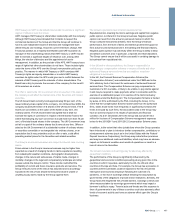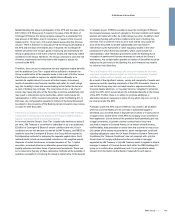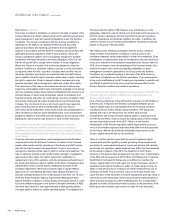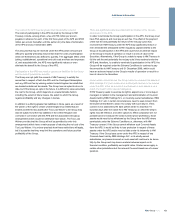RBS 2010 Annual Report Download - page 413
Download and view the complete annual report
Please find page 413 of the 2010 RBS annual report below. You can navigate through the pages in the report by either clicking on the pages listed below, or by using the keyword search tool below to find specific information within the annual report.
Changes in interest rates, foreign exchange rates, credit spreads, bond,
equity and commodity prices, basis, volatility and correlation risks and
other market factors have significantly affected and will continue to affect
the Group’s business and results of operations.
Some of the most significant market risks the Group faces are interest
rate, foreign exchange, credit spread, bond, equity and commodity price
and basis, volatility and correlation risks. Changes in interest rate levels,
yield curves and spreads may affect the interest rate margin realised
between lending and borrowing costs, the effect of which may be
heightened during periods of liquidity stress, such as those experienced
in recent years. Changes in currency rates, particularly in the sterling-US
dollar and sterling-euro exchange rates, affect the value of assets,
liabilities, income and expenses denominated in foreign currencies and
the reported earnings of the company’s non-UK subsidiaries (principally
Citizens Financial Group, Inc. (“Citizens”), The Royal Bank of Scotland
N.V. (which was renamed from “ABN AMRO Bank N.V.” on 6 February
2010) (“RBS N.V.”) and RBS Securities Inc.) and may affect income from
foreign exchange dealing. The company prepares its consolidated
financial statements in sterling. Fluctuations in the exchange rates used
to translate other currencies into sterling affect the company’s reported
consolidated financial condition, results of operations and cash flows from
year to year and those of the Group’s operations whose functional
currency is not sterling.
The performance of financial markets may affect bond, equity and
commodity prices and, therefore, cause changes in the value of the
Group’s investment and trading portfolios. This has been the case during
the period since August 2007, with market disruptions and volatility
resulting in significant variations in the value of such portfolios. As part of
its ongoing derivatives operations, the Group also faces significant basis,
volatility and correlation risks for which materialisation is highly
dependent on relative changes in the first order risks referred to above.
While the Group has implemented risk management methods to mitigate
and control these and other market risks to which it is exposed, it is
difficult, particularly in the current environment, to predict with accuracy
changes in economic or market conditions and to anticipate the effects
that such changes could have on the Group’s financial performance and
business operations.
The Group’s borrowing costs, its access to the debt capital markets and
its liquidity depend significantly on its and the UK Government’s credit
ratings.
The company, the Royal Bank and other Group members have been
subject to a number of credit rating downgrades in the recent past. Any
future reductions in the long-term or short-term credit ratings of the
company or one of its principal subsidiaries (particularly the Royal Bank)
would further increase its borrowing costs, require the Group to replace
funding lost due to the downgrade, which may include the loss of
customer deposits, and may also limit the Group’s access to capital and
money markets and trigger additional collateral requirements in
derivatives contracts and other secured funding arrangements.
Furthermore, given the extent of the UK Government ownership and
support provided to the Group through HM Treasury’s guarantee scheme
(announced by the UK Government on 8 October 2008) (the “Credit
Guarantee Scheme”), any downgrade in the UK Government’s credit
ratings could materially adversely affect the credit ratings of Group
companies and may have the effects noted above. Standard & Poor’s
Credit Market Services Europe Limited reaffirmed the UK Government’s
“AAA” rating with stable outlook on 26 October 2010 and Moody’s
Investors Service Limited reaffirmed the UK Government’s “Aaa” rating
on 7 May 2010. Fitch Ratings Limited reaffirmed the UK Government’s
“AAA” rating with stable outlook on 31 July 2009 and Moody’s Investors
Service Limited reiterated the UK Government’s stable outlook on 23
June 2010. Credit ratings of RBS N.V., Ulster Bank and Citizens are also
important to the Group when competing in certain markets, such as over-
the-counter derivatives. As a result, any further reductions in the
company’s long-term or short-term credit ratings or those of its principal
subsidiaries could adversely affect the Group’s access to liquidity and
competitive position, increase its funding costs and have a material
adverse impact on the Group’s earnings, cash flow and financial
condition or result in a loss of value in the Securities.
The Group’s business performance could be adversely affected if its
capital is not managed effectively or as a result of changes to capital
adequacy and liquidity requirements.
Effective management of the Group’s capital is critical to its ability to
operate its businesses, to grow organically and to pursue its strategy of
returning to standalone strength. The Group is required by regulators in
the UK, the US and other jurisdictions in which it undertakes regulated
activities, to maintain adequate capital resources. The maintenance of
adequate capital is also necessary for the Group’s financial flexibility in
the face of continuing turbulence and uncertainty in the global economy.
Accordingly, the purpose of the issuance of the £25.5 billion of B shares,
the grant of the Contingent Subscription and the previous placing and
open offers was to allow the Group to strengthen its capital position. The
FSA’s liquidity policy statement issued in October 2009 states that UK
regulated firms must hold sufficient eligible securities to survive a liquidity
stress and that liquidity policy statement, together with the developments
described below, has resulted in the Group holding a greater amount of
government securities to ensure that it has adequate liquidity in times of
financial stress.
On 17 December 2009, the Basel Committee on Banking Supervision
(the “Basel Committee”) proposed a number of fundamental reforms to
the regulatory capital framework in its consultative document entitled
“Strengthening the resilience of the banking sector”. On 12 September
2010, the Group of Governors and Heads of Supervision, the oversight
body of the Basel Committee, announced further details of the proposed
substantial strengthening of existing capital requirements, and the
reforms were endorsed by the G-20 leaders after the G-20 Summit in
Seoul in November 2010. On 16 December 2010, the Basel Committee
published the Basel III rules in documents entitled “Basel III: A global
regulatory framework for more resilient banks and banking systems”
(containing the reforms relating to capital) and “Basel III: International
framework for liquidity risk measurement, standards and monitoring”
(containing the reforms relating to liquidity).
411RBS Group 2010
Additional information


